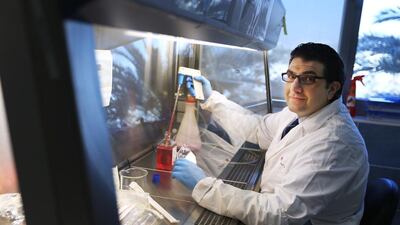ABU DHABI // A scientist has reprogrammed skin cells to behave like those of heart muscle, in a breakthrough that could be of great value to medicine.
Dr Nicolas Christoforou’s work as an assistant professor at Khalifa University in Abu Dhabi is of much interest to researchers across the world trying to find ways to produce heart tissue in the laboratory.
The tissue could be used to repair hearts that have suffered damage during cardiac arrests.
“We believe that this project is extremely significant both for basic science as well as for future therapeutic applications,” Dr Christoforou said.
Three in every 10 deaths in the UAE are caused by cardiac disease and doctors have had patients as young as 28 with heart attacks.
That means the risk of heart disease starts 10 years earlier here than in western countries.
In highly complex procedures, the researchers began with human dermal fibroblast cells that are found in human skin and produce connective tissue, often in response to injury.
To reprogramme these cells they added small sections of genetic material called micro-RNAs, and transcription factors, which are proteins that activate particular genes.
The cells were also manipulated in other ways, and the result was that many of them started to behave like heart muscle cells, expressing the same genes cells and having the same biochemical processes activated.
Dr Christoforou said the key achievement was to identify what conditions and substances were needed to make dermal fibroblast cells undergo this change. Reprogramming one cell type into another is known as transdifferentiation.
“We were extremely pleased to be able to define and report these parameters,” he said.
Conversion into cardiomyocytes did not happen with all cells but a similar approach might mean that scientists could generate large numbers of human heart cells in the laboratory, and these could help in regeneration of damaged heart muscle.
Other scientists have found that injecting monkeys with heart cells helps the organ to repair itself and to pump blood more effectively.
“I feel that the field of transdifferentiation is in its infancy and will expand significantly over the next few years,” said Dr Christoforou.
He said there was a particular focus on producing neurons, or nerve cells, but that “an increasing number of reports” are looking at transdifferentiation.
“The impact of this approach in medical applications is huge as it would allow the formation of cells in the laboratory in an efficient manner,” Dr Christoforou said.
The work was published in the journal Scientific Reports.
Dr Christoforou, who recently left Khalifa University after five years and is now principal scientist for North Carolina company Humacyte, which produces human tissue replacements, is the joint senior author of the work.
Although the findings have been published only recently, work on the project goes back about four years and was built on previous research by Dr Christoforou and his five co-authors.
newsdesk@thenational.ae


